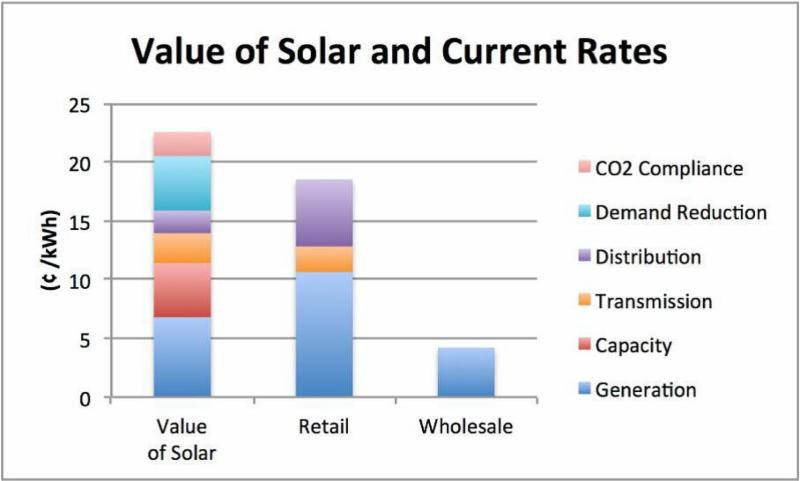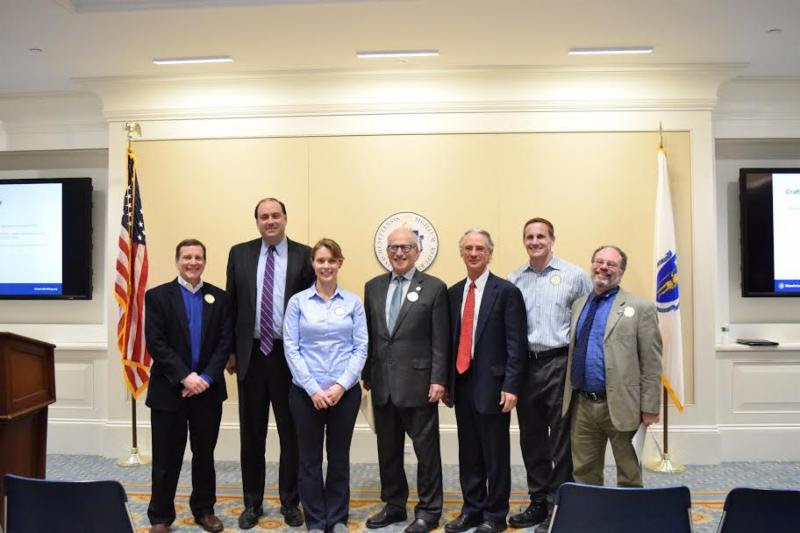A primer on solar energy and policy in Massachusetts

Rep. Frank Simzik and his staff have put together a fantastic solar briefing as part of a recent solar policy update e-mailed to constituents and supporters. We loved it so much we thought we'd share it with you.
Solar Energy in Massachusetts: What is solar net metering and how can it benefit communities in the Commonwealth?
Solar Net Metering: The Basics
What is solar net metering?
Utility company customers who generate energy through solar installations can sell the excess energy they produce each month back into the grid. Net Metering customers are only billed for their "net" energy usage. If a customer produces more energy than is used in a month, a credit for the unused energy is added to their bill. This credit can then be carried to later months when the customer does not produce excess energy, or it can be shared/sold to his or her neighbors.
How are individuals compensated?
Individuals who utilize solar net metering are compensated in two ways: the net metering credit and the solar incentive program. The net metering credit compensates customers for energy they deliver to the grid from their solar panels. The credits are calculated in kilowatts of energy generated per hour (kWh) and are provided to owners on their energy bill. Currently this net metering credit is close to the "retail rate" of energy, or the rate you pay on your utility bill for energy from resources like natural gas, without charges for state programs and other utility charges.
Additionally, individuals who net meter receive payment in the form of a solar incentive. This incentive is administered by the Department of Energy Resources. The incentive program issues solar renewable energy credits (SRECS) for each megawatt (MW) produced by a solar system. This incentive compensates solar for its environmental and societal benefits, and the current program was designed to manage the growth of solar to 1600MW.
What are net metering caps?
The net metering caps are an arbitrary energy capacity restriction for how much energy can be net metered at any given time. These caps are percentages of each utility's historic peak energy load. The current caps are 4% for private projects and 5% for public projects.
What is the current issue with the "caps"?
Currently the net metering caps have been hit in the National Grid and Unitil services areas. These service areas represent 175 communities in the Commonwealth. This means that many of the proposed projects in these areas will be unable to get the net metering credit for their energy production and will be unable to proceed.
Furthermore, placing a cap on any industry results in uncertainty and doesn't allow the industry to grow effectively. The solar net metering caps have been raised through legislation four times since their creation.
What is a minimum bill?
A minimum bill is a fixed monthly charge for solar customers in the Commonwealth. Utilities claim that solar customers need to pay a fixed fee to make sure all customers are paying for the use and upkeep of our energy grid. There are two issues with a minimum bill. First, a fixed fee does not take into account the benefits solar provides the grid, like decreasing the need to build transmission lines to import energy from outside our state. Second, a costly minimum bill could diminish any saving solar projects provide customers and communities, and will disproportionately affect low income, municipal, and community shared solar projects.
How much solar is installed in the Commonwealth?
There are currently 985MW of solar energy installed (in some form) in 350 of the Commonwealth's 351 cities and towns.
How can you access solar?
In Massachusetts only about 20% of individuals can access solar on their property (home rooftop solar). These projects have a variety of financing mechanisms available. For the remaining 80% of individuals, solar energy is accessible through community shared solar projects. Community shared solar projects are solar arrays built on brownfields, landfills, or other land parcels. These projects are available because of virtual net metering, which allows customers to receive net metering credits for projects, even if they are not on their property, and allow several energy customers to share the benefits of a solar system. Community solar is important for renters, low-income housing developments, and homeowners unable to access solar because of roof orientation or tree cover.

A comparison of the value of solar (according to an Acadia Center analysis) with the current retailrate (net metering credit) and the wholesale rate for energy in Massachusetts.
What the Legislature is Currently Debating
The House and Senate each passed a solar net metering bill prior to the 2015 holiday recess; these bills were then sent to a conference committee for the House and Senate to work through their differences. Unfortunately, the committee has yet to come to a compromise between the two bills and the solar industry in Massachusetts is suffering as a result of this inaction. The two bills are:
1) House Bill 3854, which:
- Raises the public and private net metering caps a mere 2% each
- Preserves the current system until the state hits 1600MW and allows existing projects to stay in their current program for 20 years
- Post 1600MW, retains the current net metering rate for resident and small commercial projects, and decreases the rate to the wholesale service rate for all other projects (A decrease of about 70%)
- Creates a new solar incentive program
- Includes a minimum bill proposal for all solar customers post 1600MW
2) The Senate's counter proposal Senate Bill 2058, which:
- Raises the public and private net metering caps a mere 2% each
- Preserves the current incentive program until the state hits 1600MW and allows existing projects to stay in their current program for 30 years
- Post 1600MW, retains the current net metering rate for resident and small commercial projects, decreases the rate 55% for large and medium projects, and decreases the rate 33% for municipal, virtual, and community shared projects
- Creates a new solar incentive program
What Ideal Solar Policy Will Look Like
Massachusetts has created solar policy in the past which has sparked innovation, helped reduce our greenhouse gas emissions, stimulated our economy, and produced clean locally sourced energy. We can and should be able to achieve these same goals moving forward. Doing so means reducing our reliance on energy resources from outside the state and fueling our local economy. The following should be part of any future solar policy in the Commonwealth:
- Eliminate the net metering caps, which create uncertainty in the solar industry and set an ambitious goal for future solar capacity in the state
- Preserve current net metering and virtual net metering frameworks
- Initiate a comprehensive, transparent, and publicly scrutinized study to determine the appropriate value of solar energy
- Create a new solar incentive program which will reduce costs appropriately and incentivize diverse solar installations across the state
- Grandfather current existing solar projects into their current programs to maintain the security of investments across the state
- Avoid any minimum bills. These charges disproportionately punish low income, municipal, and community shared solar customers, and will be unnecessary after a comprehensive value of solar study is conducted
Over the next few months the legislature will be debating how our state will meet its energy needs moving forward. During this time there will be many voices supporting an array of energy options. Some of the options I am sure you may have heard mentioned are new natural gas pipelines, imports of Canadian hydropower, and development of offshore wind farms. During this debate, I will continue working with my colleagues to ensure that Massachusetts is no longer at the end of the energy pipeline, and that we are incentivizing clean local energy. Doing this will create local jobs, benefit our communities, improve public health, and help us reach our greenhouse gas reduction goals.

Earlier this month, I co-hosted a briefing about solar policy at the State House with Senator Eldridge and Representative Hecht. Two speakers, Emily Rochon (Boston Community Capital) and Larry Aller (Next Step Living), outlined how legislation passed by the House last November would negatively impact the Massachusetts solar industry if passed into law. Our speakers also outlined how the state can craft good solar policy that will appropriately value solar energy production, stimulate and continue the growth of Massachusetts' clean energy economy, and help us meet our greenhouse gas reduction goals.


